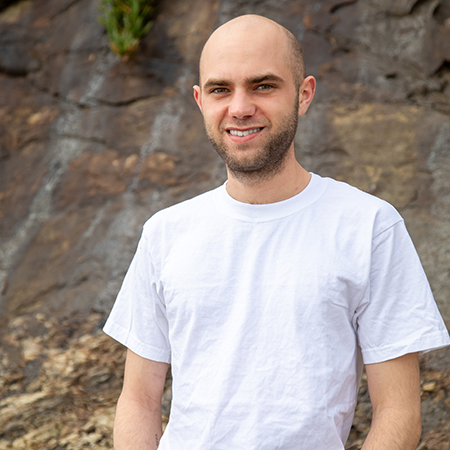Campus News
Balancing carbon sequestration and community benefits
UCSC student Cole Seither addresses the delicate balance between agroforestry, carbon sequestration, and community benefits in combating climate change. His research is supported by the Earth Futures Institute’s Frontier Fellows program.

Cole Seither (Rachel Carson ’24, agricultural ecology) was drawn to UC Santa Cruz for many reasons: the cutting-edge agro ecology program, the location of the campus, and his familiarity with the city of Santa Cruz. Seither transferred to UCSC from Cuesta Community College in 2022 and is ready to graduate this Spring with a completed senior thesis.
His thesis focuses on agroforestry, the use of trees in an agricultural context to aid in carbon sequestration–the reduction of CO2 levels in the atmosphere. Seither’s research proposes that agroforestry not only is useful in combating climate change, but also has the potential to improve livelihoods of local communities in the global South.
“Agroforestry has a really exceptional potential for benefiting locals partly because trees are used for food, fiber, and fuel,” Seither said. “They improve the local ecosystems, biodiversity, the water cycle and the carbon cycle, prevent soil erosion—all sorts of things. It’s a really productive, diverse, and flourishing ecosystem when it’s done right.”
Seither’s research looks at the balance between using agroforestry for carbon credits and community benefit. His project informs stakeholders of the potential benefits, but also educates them on the risks.
“If you’re trying to sequester a lot of carbon, you might not end up producing one of those systems that’s really fruitful and beautiful,” Seither said. “That was the impetus for this project: how do these organizations balance carbon sequestration with securing benefits to local communities?”
Seither was motivated to pursue his senior thesis after working on a project with one of Environmental Studies Professor Karen Holl’s postdoc students. The data collection experience encouraged Seither to do his own research. It was around this time that he saw an advertisement for Earth Futures Institute’s (EFI) Frontier Fellows program in a department newsletter.
Piloted in spring 2022 by Astrophysics and Astronomy Professor Emerita Sandra Faber, the Frontier Fellows program funds undergraduate research for a full year, giving students a unique career-building experience. Faber emphasized the importance of funding and supporting undergraduate research opportunities.
“Engaging in research is a transformative journey within education,” Faber expressed. “The Frontier Fellows program uniquely empowers undergraduates to lead impactful research endeavors, providing not only inspiration but also crucial funding and mentorship. Graduates from the Frontier Fellows program emerge well-prepared for success in their chosen fields long after their college years.”
Frontier Fellows are awarded a summer training program stipend of $6,000 to pursue their research.
“For me, the financial piece of it was more like a dangling carrot,” Seither said. “That got me to pursue it. And then all of a sudden I was in it,” he said. “Now I’m realizing, this is probably the best thing that I’ll do in my time at UC Santa Cruz.”
Frontier Fellows offers students the unique opportunity to pursue transformative and hands-on research experience outside of the classroom. Seither emphasizes that pursuing his thesis has been the most challenging yet rewarding thing he’s done in school.
“It requires a lot more of me in terms of diligence, enthusiasm, and persistence. But it also has certainly enabled me to engage with professors and advisors who I think highly of. The EFI grant led me to work with Karen Holl and Madeleine Fairbairn, two people who I greatly admire, and has been very eye opening.”
Seither’s long term career goals focus on improving sustainability in the food supply chain, and he is excited about the potential to work with agroforestry and carbon credit markets in the meantime. He says his experience with Frontier Fellows and pursuing his research has opened many doors.
“Having had the opportunity to define my project very explicitly and do something that I wanted to do has sort of set me on a career path, either in academia or not.”